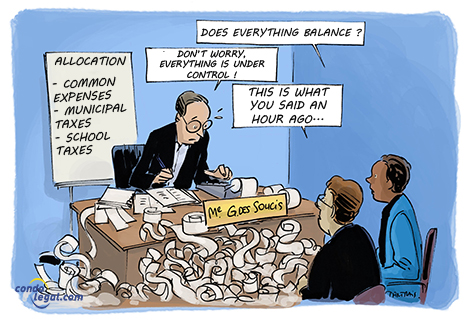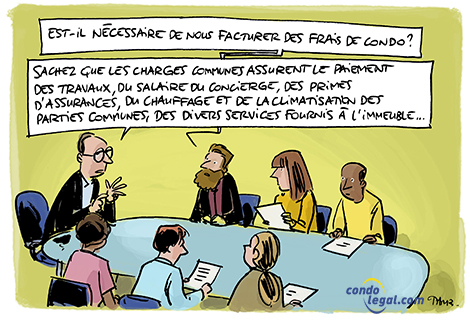Special contribution to common expenses required to all co-owners by the syndicate of co-owners to pay expenses that were not provided for in the co-ownership’s annual budget forecast. This type of request for funds is often related to the execution of work, by the syndicate when it is not possible to use the contingency fund by reason of the nature of the work, or because of a contingency fund insufficiency. Section 1072.1 of the Civil Code of Quebec stipulates that board of directors shall consult the meeting of the co-owners before deciding on any special contribution to the common expenses.
 WARNING! Sellers have already been ordered by the courts to reimburse their purchaser for special assessments as damages.
WARNING! Sellers have already been ordered by the courts to reimburse their purchaser for special assessments as damages.

18/11/2024
A study of the contingency fund was recently conducted by a professional. This analysis highlighted two possible scenarios: 1. Scenario 1 (status quo): This scenario, which is not recommended by the professional, would maintain the current contributions but would result in a deficit within approximately fifteen years, requiring the use…...
26/09/2024
Question: I bought my apartment 3 months ago and I just attended my first meeting of co-owners. To my great surprise, I learned that major masonry work had to be done on the building. My seller never told me about it, even though it is obvious that he must have…...

17/09/2024
Before buying the apartment of your dreams, find out about the status of the common expenses associated with it, especially those that may have remained unpaid by the seller. Common expenses, better known as " condo fees", which you will have to pay once you become a homeowner, are an essential…...

01/07/2024
Article 1726 paragraph 1 of the Civil Code of Quebec, provides that " The seller is bound to warrant the buyer that the property and its accessories are, at the time of the sale, free of latent defects which render it unfit for the use for which it was intended or…...

27/06/2024
Co-ownership work is of the utmost importance. Yet, they are more often than not overlooked by the syndicates of co-owners. Work that needs to be done in common portions can be minor or major in scope. Yet one needs money to pay for them. Good financial planning is therefore advisable…...

25/05/2024
Most insurance policies include deductibles, with amounts varying based on the insured risk. For example, the deductible for water damage is generally higher than that for fires. The purpose of the deductible is to make the insured responsible by having them cover part of the repair costs for damages caused by…...

30/03/2024
Common expenses are payable by the person who is the title owner upon receipt of the notice of assessment. However, when selling a fraction, the buyer may be required to pay with interest for all common charges owed by the seller (Article 1069 of the Civil Code of Québec). It…...

01/03/2024
The co-ownership (condominium) gives rise to expenses relating to the maintenance of the common portions and the day-to-day administration of the syndicate. Administrative, maintenance, replacement, improvement or alteration expenses of the common portions are divided among the co-owners of the immovable. General common expenses are to be distinguished from particular common…...

29/02/2024
Preparing a forecast annual budget is an unavoidable task in a co-ownership (condominium); its preparation, preliminary examination and adoption will ensure the proper functioning of the syndicate of co-owners. It is up to the board of directors to define the terms of the forecast annual budget based on the expenses that will have to…...

28/03/2023
La webradio du mercredi 29 mars 2023 a porté sur le mode de répartition des charges communes entre les copropriétaires. La copropriété donne lieu à des dépenses relatives à l’entretien des parties communes et l’administration courante du syndicat. Les coûts d'administration, d'entretien, de remplacement, d'amélioration ou de transformation des parties communes constituent des…...

25/10/2010
When selling an immovable, the buyer is required to pay with interest on all common expenses owed by the seller (article 1069 of the Civil Code of Quebec). The syndicate will then be able to claim sums from him that he never thought he would have to pay. However, if…...
